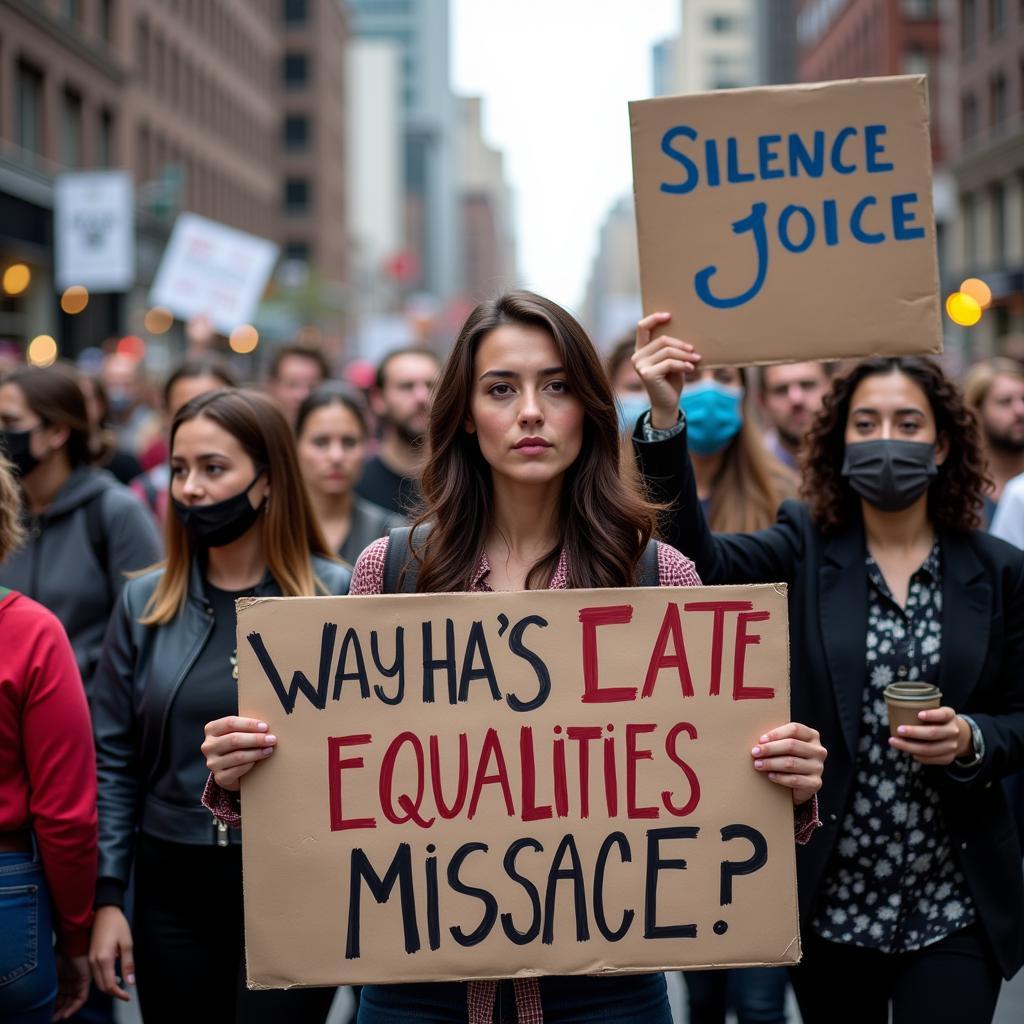The Silent Society isn’t about a group refusing to speak, but rather those whose voices are unheard or actively suppressed. This encompasses various aspects of societal silence, from marginalized communities lacking platforms to individuals silenced by fear or oppression. Understanding this complex phenomenon is crucial for fostering peace and promoting positive change.
 Marginalized communities often face systemic barriers to having their voices heard.
Marginalized communities often face systemic barriers to having their voices heard.
The Many Faces of the Silent Society
The silent society manifests in various ways. It can be seen in communities facing systematic discrimination, where their concerns are often dismissed or ignored. It can also be observed in individuals who self-censor due to fear of repercussions, be it social ostracization or legal consequences. Furthermore, the digital age, while offering new avenues for expression, can paradoxically amplify the silence of certain groups, particularly those lacking access to technology or facing online harassment. Understanding these diverse facets is the first step towards giving voice to the unheard.
What constitutes a “silent society”? It’s not merely the absence of noise, but rather the suppression of perspectives, the stifling of dissent, and the marginalization of entire communities.
The Impact of Silence on Individuals and Communities
The consequences of being silenced can be devastating. Individuals may experience feelings of isolation, powerlessness, and frustration. This can lead to mental health issues, disengagement from civic life, and even radicalization. On a broader scale, societal silence can hinder progress, perpetuate injustice, and fuel conflict. When certain voices are consistently excluded, it creates an incomplete picture of reality, leading to flawed policies and social divisions. Recognizing the detrimental impact of silence is crucial for building a more just and peaceful world.
 The impact of silence can be devastating for individuals and communities, leading to feelings of isolation and powerlessness.
The impact of silence can be devastating for individuals and communities, leading to feelings of isolation and powerlessness.
Breaking the Silence: Empowering the Voiceless
Breaking the silence requires a multi-pronged approach. It starts with creating safe spaces for dialogue and encouraging open communication. This includes promoting media literacy and critical thinking skills to help individuals discern misinformation and navigate the complex information landscape. Furthermore, empowering marginalized communities to share their stories and advocate for their rights is essential. This requires providing them with the necessary resources, platforms, and support to amplify their voices and ensure they are heard.
Building Bridges: Fostering Dialogue and Understanding
Dialogue is a powerful tool for breaking down barriers and building understanding. Creating opportunities for individuals from different backgrounds to connect and share their perspectives can foster empathy and challenge preconceived notions. This can be achieved through community forums, workshops, and online platforms that prioritize respectful communication and constructive engagement. By fostering dialogue, we can build bridges between communities and create a more inclusive and harmonious society.
How can we build bridges between the silent and the heard? It requires creating spaces for dialogue, amplifying marginalized voices, and actively listening to unheard perspectives.
Conclusion
Understanding and addressing the complexities of the silent society is crucial for building a more peaceful and just world. By empowering the voiceless, fostering dialogue, and challenging systems of oppression, we can create a society where all voices are heard and valued. Let’s work together to break the silence and build a future where everyone has the opportunity to contribute to a more harmonious and inclusive world.
FAQ
- What is the silent society?
- How does silence impact individuals and communities?
- How can we empower the voiceless?
- What role does dialogue play in breaking the silence?
- How can we build bridges between different communities?
- What are some examples of the silent society in the digital age?
- How can we promote positive change and address societal silence?
Common Situations
- Individuals feeling unheard or ignored within their communities.
- Marginalized groups facing systemic discrimination and exclusion.
- Self-censorship due to fear of repercussions.
- Lack of access to platforms for expression and advocacy.
- Online harassment and silencing of dissenting voices.
Further Exploration
Explore related articles on our website, such as “benton franklin humane society photos“
For support, contact us 24/7 at Phone: 02043854663, Email: societyforpeace@gmail.com, or visit us at Khu 34, Bac Giang, 260000, Vietnam.
 using WordPress and
using WordPress and